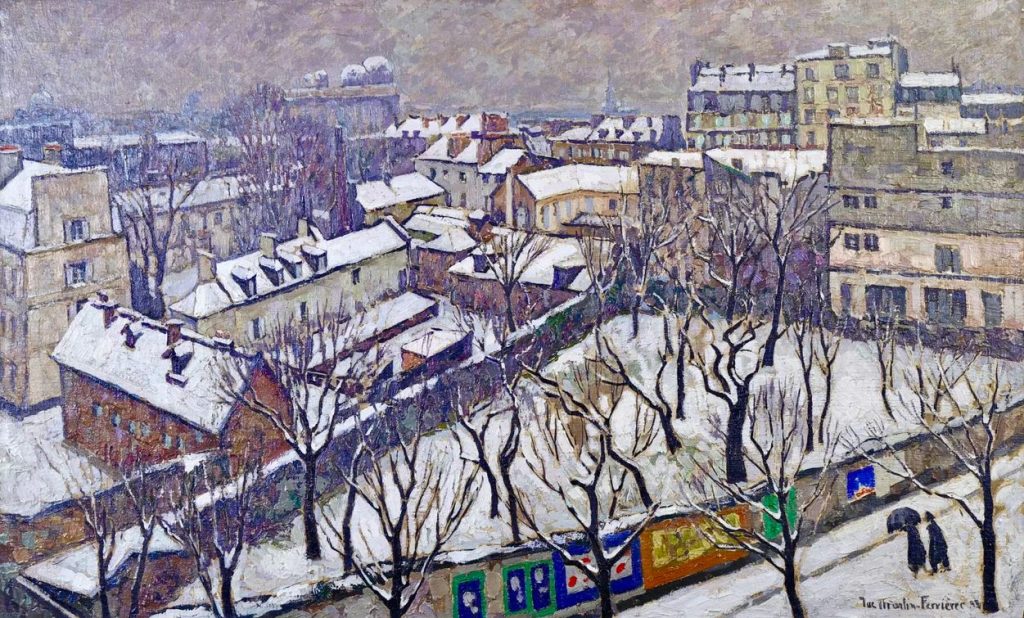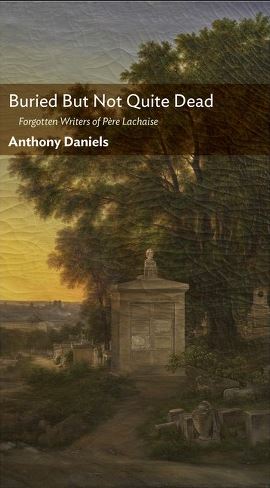by David Platzer (April 2024)

 Anthony Daniels, probably better known by his pen name as Theodore Dalrymple, and senior editor of New English Review, always provides a reliable and stimulating read. His new book, a paperback published by The New Criterion’s book division, features a attractive cover from a painting, Paris Vu des Hauteurs du Père Lachaise by Louise-Joséphine Sarazin de Belmont, a forgotten painter to match the forgotten writers now lying in Père Lachaise to which the book’s subtitle alludes. Some might wonder the use of exploring neglected authors left abandoned on posterity’s shelf. Reading the book of unflagging interest soon convinces there is every value in discovering these writers—mostly of them active in the nineteenth century. This should be no surprise. I have, myself, witnessed writers who influenced me in my youth disappear from public view though I can still read them with pleasure. Not every writer can survive through time as a literary giant but even those who served well in their period only to be ignored afterwards can still glow again when a reader opens their pages.
Anthony Daniels, probably better known by his pen name as Theodore Dalrymple, and senior editor of New English Review, always provides a reliable and stimulating read. His new book, a paperback published by The New Criterion’s book division, features a attractive cover from a painting, Paris Vu des Hauteurs du Père Lachaise by Louise-Joséphine Sarazin de Belmont, a forgotten painter to match the forgotten writers now lying in Père Lachaise to which the book’s subtitle alludes. Some might wonder the use of exploring neglected authors left abandoned on posterity’s shelf. Reading the book of unflagging interest soon convinces there is every value in discovering these writers—mostly of them active in the nineteenth century. This should be no surprise. I have, myself, witnessed writers who influenced me in my youth disappear from public view though I can still read them with pleasure. Not every writer can survive through time as a literary giant but even those who served well in their period only to be ignored afterwards can still glow again when a reader opens their pages.
Some of the authors selected by Daniels are not entirely forgotten. The name of François-Vincent Raspail (1796-1878) appears as the title of Paris’s most celebrated boulevards, even if most of those who walk or even live on the street don’t know who the man was. I found Raspail—who wrote about a host of subjects from embryology to chemistry to medicine to politics and ecomomics—less interesting than most of the other writers in the book, but Daniels ends his essay on him by saying that “for all his defects, an air of greatness hangs over him and he deserves his boulevard.” One has to agree on reading that Raspail played his violin to calm a hostile mob.
The three volumes of Enrique Gomez Carrillo’s autobiography was reprinted in his native Guatemala in 2011 and Gomez Carrillo (1873-1927), described by Daniel as “a protean figure … intelligent, bold, brave, charming, talented, cultivated, multifarious, hardworking and unscrupulous” with a great enjoyment of women. He may now be swapping anecdotes with Casanova, Byron and Errol Flynn. Émile Souvestre (1806-54), a Breton and thus no more French than someone of Welsh, Scottish or Cornish origins is English, was the subject of a book by David Steel subtitled “A Breton in Letters” published in Rennes in 2013. Souvestre, successful in his lifetime as a man of letters, published so many books on a wide range of themes that his biographer admitted that he couldn’t read them all. Souvestre mourned that his style was of the same “rough stone” as the monuments of his native Brittany rather than “flowing and diverse” in the way he wished. He may have been too modest. Daniels discusses Souvestre’s last book, Souvenirs d’un Viellard/Memoirs of an Old Man, a novel published after Souvestre’s death at the early age of 48 and found it “interesting” and in places “amusing. It speaks to our own times; I think it might bear commercial republication.”
Souvestre is not the only author of those whom Daniels, a doctor by profession, has examined and found their work to be deserving of revival. Alice-René Brouillhet (1887-1960), was the least well-known of these writers even though her fiction and travel books were published in her lifetime. Daniels regards Alice Brouillhet’s sister, Léone Devimeur-Dieudonné, buried in the same tomb, more interesting as a novelist, though she wrote only one novel, La Colombe blessée (The Wounded Dove), published the year of her death, aged 35, in 1920. The book of Alice-René Brouillhet’s that is “difficult to obtain and expensive to buy, deserves to live,” according to Daniels, is her Héros sans gloire (Heroes without Glory). She was briefly married to a young doctor, René Brouillhet, whose name she bore for the rest of her life, and who died at age twenty-three, working to the cost of his health and eventually life, at the front. The book tells of him as one of 1,500 French doctors who perished during that war. Her book celebrates their gallantry.
Several of the authors wrote at length about Russia—that land ever disturbing, mysterious and frightening—with a recurring element of madness which does not prevent some gullible Westerners, including two writers discussed in the book, Jules Cornély (1845-1907) and Jean-Richard Bloch (1884-1947), from being seduced by two cruel Russian regimes. In Cornély’s case, Tsarist, and in Bloch’s, Soviet. Gomez Carrillo, mentioned earlier above, was more sophisticated and his 1905 book, La Rusia Actual (The Russia of Today) is described by Daniels as “an extremely powerful denunciation of the oppressive nature of Tsarism and can be read as a corrective to the … notion that, because the communist regime was vastly worse than the Tzarism … the latter was not really that bad.” Putin, who began his career as a KGB colonel, is only the latest in a long unbroken list of monsters ruling over Russia. When he goes, he will almost certainly be succeeded by another tyrant. Gomez Carrillo disliked St Petersburg which he described as “an encampment of palaces.” In the 1905 war between Russia and Japan, Gomez Carrillo, a “frivilous aesthete turned serious social commentator,” was entirely on the side of Japan—to him a paradise of exquisite beauty even though he found Toyko “wretched.” In fairness, Comély’s visit to Russia was brief and he belonged to the kind of lower-middle-class fellow who worshiped the upper class. A fervent Catholic, he had his finest hour when he fiercely publicly battled for Dreyfus’s innocence at a time when doing so was dangerous. Bloch, buried in Père Lachaise’s Communist section, started as a interesting writer prior to his conversion to Marxism. His last work celebrated Stalin.
Eugène-Melchior de Vogüé (1848-1910) was, in time, proclaimed “the Chateaubriand of the Second Empire” and also “the Chateaubriand of the Third Republic.” He served in the French embassy in St Petersburg. Vogüé wrote two books about Russia, Le Fils de Pierre le Grand (The Son of Peter the Great) which Daniels wrote can be “read with great pleasure and instruction to the non-specialist” and Le Roman Russe (The Russian Novel) which became his most famous book and the reason why he became an “Immortal” of the Academié Française—a laurel that only occasionally bestows literary immortality. For Vogüé, the Russian novel surpassed all others and, with his selection of Gogol, Turgenev, Tolstoy and Dostoevsky as the best among Russian novelists, he showed acute judgement, considering that three of the four were then still living and writing. Set in lands then ruled by the Ottoman Empire and also Mount Athos in Greece, Vogüé’s 1876 travel book, Syria, Palestine et Mont-Athos: Voyages aux pays du passé (Syria, Palestine and Mount Athos: Journeys to Countries of the Past), Daniels finds the book valuable enough to be worth republishing today. The mention of Palestine in the title would thrill many in the West today for whom “Palestine” is a favorite pipe dream, though they would be disappointed to discover that Palestine, named so by Emperor Hadrian for a territory in the Roman Empire, was never the sovereign state they imagine. Vogüé, whom Daniels writes was not anti-Jewish, had little complimentary to say about Jews he saw dressed in “strange and sordid costume … long black coat, patched and greasy, conical hat, peasant cap or strange headwear…” Similarly, Vogüé was appalled by what he saw of the Greek Orthodox world that he witnessed at Mount Athos, which was “ridiculous” to his mind. The Greeks, to Vogüé, were “weak, effete and degenerate.” Nor did he care for Anglican and American missionaries. His praise was reserved for the Ottoman Turks who controlled their territories with “a certain tolerance” as well as the Russian Orthodox. Vogüé’s paeans for Russian peasant pilgrims Daniels finds foolish in its naïve misplaced optimism and prefiguring later generations’ belief that Russian Bolshevism was the way of the future. Vogüé’s dismissal ten years later of Rousseau’s “noble savage,” in The Russian Novel, was more sophisticated. Vogüé, who in youth, wished only to write rather than devoting his life to public service, later left diplomacy for politics as a deputy (1893-98) in the National Assembly, though he was “too upright, straightforward and intellectually honest” to swim in that corrupted pool. The experience inspired a novel, Les Morts qui Parlent (The Dead that Speak), which can seem interesting enough to intrigue modern readers. Written eighteen years before the Russian Revolution, it features a character, a femme fatale—a beautiful Russian princess whose riches do not prevent her from being “a revolutionary socialist” who “prefigures the horrors of totalitarianism.” One likes to think that this stimulating and lively book might spark an interest in Vogüé and several of the other authors Daniels writes about so acutely.
Table of Contents
David Platzer is a belated Twenties Dandy-Aesthete with a strong satirical turn, a disciple of Harold Acton and the Sitwells whose writing has appeared in the New Criterion, the British Art Journal, the Catholic Herald, Apollo, and more.
Follow NER on Twitter @NERIconoclast
- Like
- Digg
- Del
- Tumblr
- VKontakte
- Buffer
- Love This
- Odnoklassniki
- Meneame
- Blogger
- Amazon
- Yahoo Mail
- Gmail
- AOL
- Newsvine
- HackerNews
- Evernote
- MySpace
- Mail.ru
- Viadeo
- Line
- Comments
- Yummly
- SMS
- Viber
- Telegram
- Subscribe
- Skype
- Facebook Messenger
- Kakao
- LiveJournal
- Yammer
- Edgar
- Fintel
- Mix
- Instapaper
- Copy Link










2 Responses
“Not quite dead,” indeed. I believe it was Pericles who said that immortality was to live on in the hearts of other men. I’m sure he meant women too. By that measure, if you are dead and still read, then that may be a s good as it gets for scribblers.
“Dead and still reading.” That’s a paradise to die for.